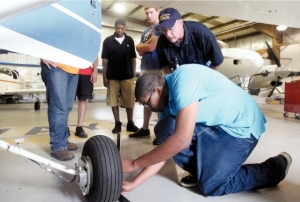Up in the air: Keeping planes flying
By Phyllis Moore
Published in News on October 9, 2012 1:46 PM

News-Argus/TROY HERRING
Deshawnte Washington measures out wheel distance on a plane prior to a weight check as professor David Perry, center, looks on during a class period of the Aviation Systems Technology Program held at the Wayne Executive Jetport. The program, which prepares students for a career in aviation maintenance, has been offered by Wayne Community College since 1969 and was among the first of its kind in the North Carolina community college system.
PIKEVILLE -- David Perry was the kind of child who had 25 model airplanes hanging from his bedroom ceiling.
Fascinated with anything that flew, he operated remote control planes as a youngster, which served to tide him over until he could get into a cockpit of his own.
He might have started out as an accountant, but in his off hours he would fly, finally giving in and devoting his career to the field.
He has been a flight instructor, a part-time ground instructor, and even owns his own plane.
In the spring, he joined the faculty of Wayne Community College as an instructor in Aviation Systems Technology, the first such program in the state's community college system, he pointed out. Affiliated with the Federal Aviation Administration, or FAA, it was introduced at WCC in 1969.
His counterpart, Chris Metcalf, who also started in May as the program's only other instructor, shares a similar passion for the subject.
The son of an air traffic controller in the Air Force and grandson of a pilot, he can still recall his first flight, at age 4 or 5. It was at the Wayne Executive Jetport on the outskirts of Goldsboro, the same site where he now teaches.
"It all started here," he said. "I was bitten by the bug then."
After a stint in the Army, where the Goldsboro native worked on helicopters and handled government contracts, he attended WCC, graduating in 2011.
"I was very interested in being a part of aviation in my community," he said. "Wayne Community has done quite a bit for me and I'm interested in seeing the aviation program in eastern North Carolina."
Graduates of the local program can expect career opportunities that range from working at an airport to FAA repair stations, aircraft, engine or component manufacturers, and military and government aircraft maintenance.
Theirs is a comprehensive and demanding program, the instructors say.
"It's 100 percent dedication. They're not allowed to miss any time," Perry said.
In addition to the college requirements, the program features very strict guidelines to adhere to the FAA, he said.
The two-year, year-round program attracts a variety of students, from the 18-year-old fresh out of high school to the 50-year-old coming out of the military and re-entering civilian life or worker changing career fields. They come from "everywhere," Perry said, noting he has students who drive in daily from Wilmington and Raleigh.
"The program is set up, in general, you can take an individual who has no experience at all, give them an overview -- you'll have a mixed bag every time," said Metcalf.
Xavier Roddy, 18, just graduated from Charles B. Aycock High School and started in the program in August.
"I have always loved planes," he said. His father, a retired Marine, had worked on airplanes, he pointed out. "My plan is to finish this program, work on planes for awhile. My goal is to be a pilot."
As one of the youngest students, it's been a challenge adjusting to such a demanding course of study, Roddy said. Fortunately, his classmates look out for him, making the experience more enjoyable.
"The class is fantastic," he said. "We haven't got too much into the hands on stuff, but it's an exciting thing."
On the other end of the spectrum is William "Bow" Daniels. At 53, this is his second year in the program.
Living in Southport after retiring from the Air Force, he was enjoying a successful career as a paint contractor when the economy plummeted.
"My wife asked, 'What's your passion?'" he said. The retired aircraft mechanic said he had simply never pursued his former specialty as a civilian. They moved to Pikeville and he enrolled in the class.
As retired military, he could have received a waiver to bypass some of the requirements, but opted not to do that.
"I brought a thirst for knowledge," he said. "I felt like there's so much to learn. I'll take the full courses."
Having instructors with a passion for the subject matter also helps, he said.
And Perry, who admits the excitement of being around airplanes has not dissipated over the years, said he just appreciates the opportunity to share the experience with others.
"There's no place like the airport to work on airplanes," he said.
